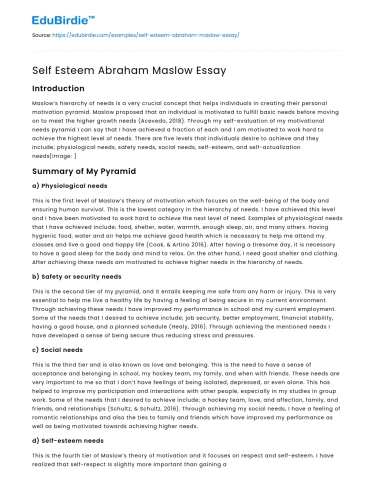Introduction
Maslow’s hierarchy of needs is a very crucial concept that helps individuals in creating their personal motivation pyramid. Maslow proposed that an individual is motivated to fulfill basic needs before moving on to meet the higher growth needs (Acevedo, 2018). Through my self-evaluation of my motivational needs pyramid I can say that I have achieved a fraction of each and I am motivated to work hard to achieve the highest level of needs. There are five levels that individuals desire to achieve and they include; physiological needs, safety needs, social needs, self-esteem, and self-actualization needs[image: ]
Summary of My Pyramid
a) Physiological needs
This is the first level of Maslow’s theory of motivation which focuses on the well-being of the body and ensuring human survival. This is the lowest category in the hierarchy of needs. I have achieved this level and I have been motivated to work hard to achieve the next level of need. Examples of physiological needs that I have achieved include; food, shelter, water, warmth, enough sleep, air, and many others. Having hygienic food, water and air helps me achieve good health which is necessary to help me attend my classes and live a good and happy life (Cook, & Artino 2016). After having a tiresome day, it is necessary to have a good sleep for the body and mind to relax. On the other hand, I need good shelter and clothing. After achieving these needs am motivated to achieve higher needs in the hierarchy of needs.
Save your time!
We can take care of your essay
- Proper editing and formatting
- Free revision, title page, and bibliography
- Flexible prices and money-back guarantee
b) Safety or security needs
This is the second tier of my pyramid, and it entails keeping me safe from any harm or injury. This is very essential to help me live a healthy life by having a feeling of being secure in my current environment. Through achieving these needs I have improved my performance in school and my current employment. Some of the needs that I desired to achieve include; job security, better employment, financial stability, having a good house, and a planned schedule (Healy, 2016). Through achieving the mentioned needs I have developed a sense of being secure thus reducing stress and pressures.
c) Social needs
This is the third tier and is also known as love and belonging. This is the need to have a sense of acceptance and belonging in school, my hockey team, my family, and when with friends. These needs are very important to me so that I don’t have feelings of being isolated, depressed, or even alone. This has helped to improve my participation and interactions with other people, especially in my studies in group work. Some of the needs that I desired to achieve include; a hockey team, love, and affection, family, and friends, and relationships (Schultz, & Schultz, 2016). Through achieving my social needs, I have a feeling of romantic relationships and also the ties to family and friends which have improved my performance as well as being motivated towards achieving higher needs.
d) Self-esteem needs
This is the fourth tier of Maslow’s theory of motivation and it focuses on respect and self-esteem. I have realized that self-respect is slightly more important than gaining admiration and respect from others. These needs are desired after achieving the need for love and belonging from family, friends, and other people in the community (Soni, & Soni, 2016). Through achieving social needs, I have developed a positive feeling of self-worth and self-esteem. Examples of self-esteem needs include; improving in my hockey team, gaining recognition, self-confidence, self-esteem, accomplishment, achievement, improve my status and respect. Through achieving these needs I feel confident and realize my contribution, and achievement as valuable and important thus motivating me towards desiring higher needs. These needs can be categorized into two; cognitive needs and aesthetic needs.
e) Self-actualization needs
This is the final tier in Maslow’s hierarchy of needs and it comprises of achieving the highest needs an individual has the potential to achieve. These needs have motivated me to live up to my potential. This level has a unique feature since it looks different for various people in the economy (Healy, 2016). For me, I need to excel in school and my work achieve success in financial and also live a positive life. Other needs include: realizing personal potential, pursuing talents, and self-fulfillment.
Conclusion
According to Maslow human beings are motivated by unsatisfied needs making them work hard to achieve them. The needs are classified into levels where an individual must achieve one level after the other. The first level is physiological needs which comprise basic needs, the second is safety needs to develop a sense of security, the third level is the social need to give an individual a feeling of love and belonging, the fourth is self-esteems where an individual’s desires to be recognized and the final level is self-actualization where an individual desire to achieve what human beings are capable of doing.
References
- Acevedo, A. (2018). A personalistic appraisal of Maslow’s needs theory of motivation: From “humanistic” psychology to integral humanism. Journal of Business Ethics, 148(4), 741-763.
- Cook, D. A., & Artino Jr, A. R. (2016). Motivation to learn: an overview of contemporary theories. Medical education, 50(10), 997-1014.
- Healy, K. (2016). A Theory of Human Motivation by Abraham H. Maslow (1942). The British Journal of Psychiatry, 208(4), 313-313.
- Schultz, D. P., & Schultz, S. E. (2016). Theories of personality. Cengage Learning.
- Soni, B., & Soni, R. (2016, July). Enhancing Maslow's Hierarchy of Needs for Effective Leadership. In Competition Forum (Vol. 14, No. 2, p. 259). American Society for Competitiveness.






 Stuck on your essay?
Stuck on your essay?

